
In Greco-Roman mythology, Aeneas was a Trojan hero, the son of the Trojan prince Anchises and the Greek goddess Aphrodite. His father was a first cousin of King Priam of Troy, making Aeneas a second cousin to Priam's children. He is a minor character in Greek mythology and is mentioned in Homer's Iliad. Aeneas receives full treatment in Roman mythology, most extensively in Virgil's Aeneid, where he is cast as an ancestor of Romulus and Remus. He became the first true hero of Rome. Snorri Sturluson identifies him with the Norse god Víðarr of the Æsir.
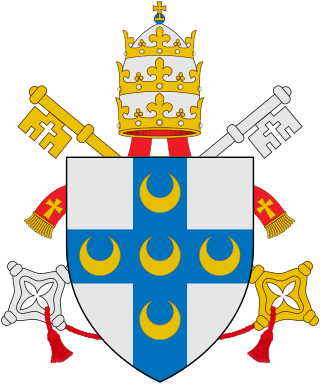
Pope Pius II, born Enea Silvio Bartolomeo Piccolomini, was head of the Catholic Church and ruler of the Papal States from 19 August 1458 to his death.

Publius Vergilius Maro, usually called Virgil or Vergil in English, was an ancient Roman poet of the Augustan period. He composed three of the most famous poems in Latin literature: the Eclogues, the Georgics, and the epic Aeneid. A number of minor poems, collected in the Appendix Vergiliana, were attributed to him in ancient times, but modern scholars consider his authorship of these poems to be dubious.
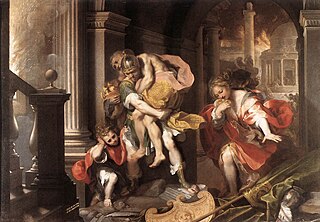
The Aeneid is a Latin epic poem that tells the legendary story of Aeneas, a Trojan who fled the fall of Troy and travelled to Italy, where he became the ancestor of the Romans. Written by the Roman poet Virgil between 29 and 19 BC, the Aeneid comprises 9,896 lines in dactylic hexameter. The first six of the poem's twelve books tell the story of Aeneas' wanderings from Troy to Italy, and the poem's second half tells of the Trojans' ultimately victorious war upon the Latins, under whose name Aeneas and his Trojan followers are destined to be subsumed.

Piety is a virtue which may include religious devotion or spirituality. A common element in most conceptions of piety is a duty of respect. In a religious context, piety may be expressed through pious activities or devotions, which may vary among countries and cultures.
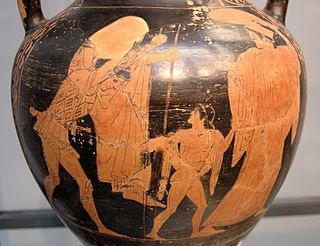
Ascanius was a legendary king of Alba Longa and is the son of the Trojan hero Aeneas and Creusa, daughter of Priam. He is a character in Roman mythology, and has a divine lineage, being the son of Aeneas, who is the son of the goddess Venus and the hero Anchises, a relative of the king Priam; thus Ascanius has divine ascendents by both parents, being descendants of god Jupiter and Dardanus. He is also an ancestor of Romulus, Remus and the Gens Julia. Together with his father, he is a major character in Virgil's Aeneid, and he is depicted as one of the founders of the Roman race.
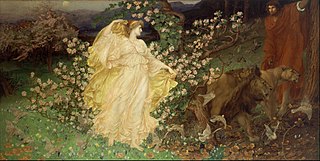
In Greek and Roman mythology, Anchises was a member of the royal family of Troy. He was said to have been the son of King Capys of Dardania and Themiste, daughter of Ilus, who was son of Tros. He is most famous as the father of Aeneas and for his treatment in Virgil's Aeneid. Anchises' brother was Acoetes, father of the priest Laocoön.

Dido, also known as Elissa, was the legendary founder and first queen of the Phoenician city-state of Carthage, in 814 BC. In most accounts, she was the queen of the Phoenician city-state of Tyre who fled tyranny to found her own city in northwest Africa. Known only through ancient Greek and Roman sources, all of which were written well after Carthage's founding, her historicity remains uncertain. The oldest references to Dido are attributed to Timaeus, who was active around 300 BC, about five centuries after the date given for the foundation of Carthage.
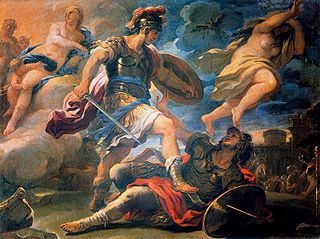
Turnus was the legendary King of the Rutuli in Roman history, and the chief antagonist of the hero Aeneas in Virgil's Aeneid.

Dido and Aeneas is an opera in a prologue and three acts, written by the English Baroque composer Henry Purcell with a libretto by Nahum Tate. The dates of the composition and first performance of the opera are uncertain. It was composed no later than July 1688, and had been performed at Josias Priest's girls' school in London by the end of 1689. Some scholars argue for a date of composition as early as 1683. The story is based on Book IV of Virgil's Aeneid. It recounts the love of Dido, Queen of Carthage, for the Trojan hero Aeneas, and her despair when he abandons her. A monumental work in Baroque opera, Dido and Aeneas is remembered as one of Purcell's foremost theatrical works. It was also Purcell's only true opera, as well as his only all-sung dramatic work. One of the earliest known English operas, it owes much to John Blow's Venus and Adonis, both in structure and in overall effect.

Aeneas Demetrius Williams is an American former football cornerback and safety who played in the National Football League (NFL) for 14 seasons, primarily with the Arizona Cardinals franchise. He played college football for the Southern Jaguars and was selected in the third round of the 1991 NFL draft by the Cardinals, where he spent 10 seasons. During his final four seasons, he was a member of the St. Louis Rams. Williams received eight Pro Bowl selections and three first-team All-Pro honors, as well as being on the second NFL 1990s All-Decade Team. He was inducted into the Pro Football Hall of Fame in 2014.

Dido, Queen of Carthage is a short play written by the English playwright Christopher Marlowe, with possible contributions by Thomas Nashe. It was probably written between 1587 and 1593, and was first published in 1594. The story focuses on the classical figure of Dido, the Queen of Carthage. It tells an intense dramatic tale of Dido and her fanatical love for Aeneas, Aeneas' betrayal of her and her eventual suicide on his departure for Italy. The playwrights relied on Books 1, 2, and 4 of Virgil's Aeneid as primary source.
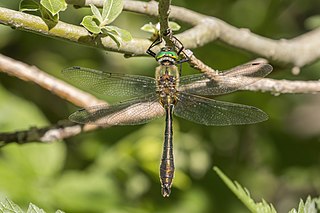
The downy emerald is a species of dragonfly. It is metallic green and bronze in color, and its thorax is coated with fine hairs, hence its name. Like most other emeralds, the downy emerald has bright shiny green eyes. Adults are around 5 cm in length, and are in flight from May through July each year.

Aeneas, Anchises, and Ascanius is a sculpture by the Italian artist Gian Lorenzo Bernini created c. 1618–19. Housed in the Galleria Borghese in Rome, the sculpture depicts a scene from the Aeneid, where the hero Aeneas leads his family from burning Troy.

Dido's Lament is the closing aria from the opera Dido and Aeneas by Henry Purcell to a libretto by Nahum Tate.

The Low Ham Roman Villa was a Roman courtyard villa located near Low Ham in the civil parish of High Ham in the English county of Somerset. It is best known for the extraordinary figured mosaic depicting the story of Aeneas and Dido.

Didone abbandonata was an opera in three acts composed by Tomaso Albinoni. Albinoni's music was set to Pietro Metastasio's libretto, Didone abbandonata, which was in turn based on the story of Dido and Aeneas from the fourth book of Virgil's Aeneid. The opera premiered on 26 December 1724 at the Teatro San Cassiano in Venice and was the first time that an opera based on a Metastasio libretto was performed in Venice.

The Golden Bough is one of the episodic tales written in the epic Aeneid, book VI, by the Roman poet Virgil, which narrates the adventures of the Trojan hero Aeneas after the Trojan War.

Belionota sagittaria is a beetle of the Buprestidae family.

Belionota sumptuosa, commonly known as the tricolor metallic wood-boring beetle, is a jewel beetle of the Buprestidae family. It is found in Indonesia.




















